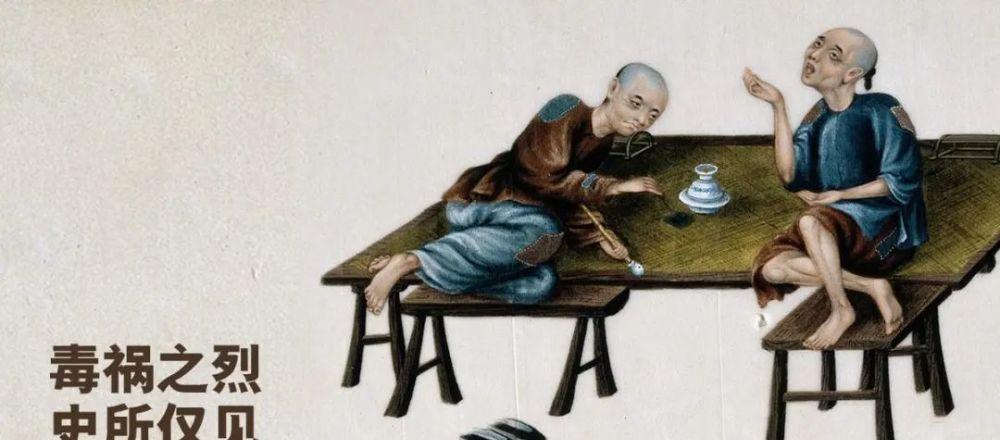
At the beginning of the nineteenth century, Britain took the lead in completing the industrial revolution, the merchant fleet was equipped with cannons, loaded with a large number of cheap products, opened up markets everywhere, and China, which was rich in land and people, became its target, but initially there was a huge deficit in British trade with China. Britain was hungry for Chinese tea, raw silk, porcelain and other goods, but its mechanical textiles were difficult to rival China's self-sufficient native cloth. In order to reverse the decline in trade, the British smuggled opium to China in large quantities for huge profits. Opium, commonly known as big smoke, was originally used as a drug, but after a large number of marketing by the British East India Company, it became a drug that was not easy to quit. Before 1765 (the thirty years of Qianlong), the export of opium to China was only 200 boxes (120 catties per box) per year, and by 1838 (the eighteenth year of Daoguang) it was more than 40,000 boxes. From 1798 (the third year of Jiaqing) to 1839 (the nineteenth year of Daoguang), the British made a profit of more than 400 million yuan by importing opium. The large amount of opium imported has seriously endangered Chinese society, from scholars to peddlers, many of whom have become "addicts", and at the same time, a large amount of Chinese silver has flowed out, resulting in state financial constraints and deterioration of people's lives. "Banning opium" as a national policy has been placed on the top agenda of the Qing court.
Opium is made from the juice of poppy fruit, and after smoking, every feeling of relaxation and relaxation is very tempting, but it is highly addictive and difficult to quit. The poppy fruit cut in the picture has a sap flowing out, and after the juice solidifies, it is collected and processed into opium paste, and can be lit and smoked.
Headquarters of the Nineteenth Century East India Company in London. Before the Opium War, the company controlled the opium trade in India and exports to China from India.
In the nineteenth century, Calcutta, India, was an important British port for the export of opium to China. As the opium trade developed in great strides, Britain earned a large amount of silver from China, reversing the original trade deficit with China. In China, on the other hand, due to the outflow of a large amount of silver, the national finances and economic livelihood have been seriously impacted.
In 1824, British opium merchant ships sailed on the Lingling Ocean opposite Guangdong, and the Chinese sailing ships on the left and right sides appeared small and backward in comparison.
Chinese sailors boarded opium smuggling ships and arrested the crew. The Qing Dynasty originally banned opium, but due to the backwardness of ships and official corruption, opium smuggling became more and more rampant in Guangdong waters after entering the nineteenth century, and opium became increasingly widespread in China.
A painting depicting a nineteenth-century Chinese opium smoke house. After the large-scale importation of opium, the number of Chinese addicts increased day by day, which seriously damaged the social atmosphere and poisoned health.
A Qing dynasty official who is smoking a big cigarette. With the proliferation of opium, the trend of opium smoking in the official arena became increasingly popular, which accelerated the corruption of the officials.
Western painters write about the Qing army in the nineteenth century. Opium was poisoned, and the generals and soldiers smoked more and more, which greatly weakened the combat effectiveness of the Qing army.
From this nineteenth-century painting, the opium addict is skinny and sluggish. At that time, China's "addicts" did not distinguish between rich and poor, occupation, from high-ranking officials and nobles to peddlers and pawns, millions of people, and the history of the evil of drugs was only seen.
Opium has comprehensively poisoned China's finances, national defense, bureaucracy, and social atmosphere. In 1838, Huang Juezi, the secretary of the Hongxu Temple, played the Daoguang Emperor and lamented the harm of opium: "With China's useful wealth, fill in the infinite gulf of foreign countries, and easily this harmful thing gradually becomes the worry of the sick country." The governor of Huguang, Lin Zexu, also advocated a strict ban on smoking, and his words were fierce, believing that if the situation was allowed to continue, "it would be so that after several decades, there would be almost no soldiers in the Central Plains that could resist the enemy, and there would be no silver that could be fed", and the Daoguang Emperor was deeply moved. A non-smoking action that shocked China and foreign countries, like an arrow in the string.
Give me [watching]
The better you look too!